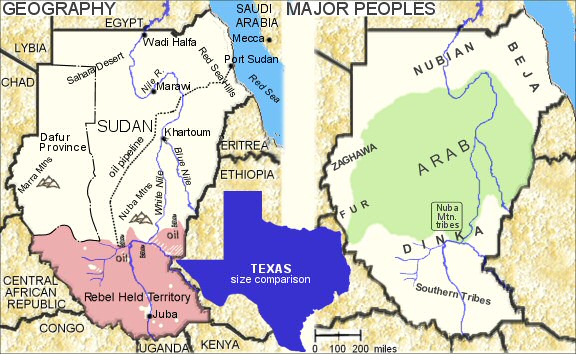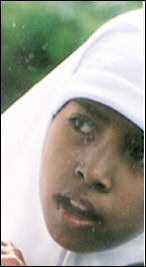 Go to NEWSLETTER BACK ISSUES
Go to NEWSLETTER BACK ISSUESGo to ARTICLE INDEX
Load Acrobat Version
"If anyone is ashamed of me and my words, the Son of Man will be ashamed of him." (Luke 9:26)
The REVEILLE SHOFAR Fourth Quarter 2004, Vol. 8 No. 4
- Feature: Secularism Begins to Copy Islam
- Feedback: Chaplain Identifies Mines in Public Prayer
- News: Military Christian Fellowships Grow Overseas
- News: Uzbeks Rush to Christ in Hardship
- Profile: Spiritual Landscape of Sudan
- Opportunity: Zwemer Institute of Muslim Studies
Secularism Begins to Copy Islam
by Dr. Bruce Sidebotham
If we define religion as belief about God rather than belief in God, then we can explain the religious fervor observed in a three way battle for global prominence between Islam, Christianity, and Secularism.
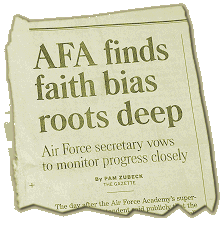 What emerged from strife-ridden reformation Europe as a peace facilitating governing philosophy featuring tolerance and compromise has become a full blown religious system demanding more than just equal time everywhere. Jihadists use terrorism against this system which says God and his revealed laws are socially irrelevant. They fight most vehemently, not against Christians, but against secularized Muslims in their own lands.
What emerged from strife-ridden reformation Europe as a peace facilitating governing philosophy featuring tolerance and compromise has become a full blown religious system demanding more than just equal time everywhere. Jihadists use terrorism against this system which says God and his revealed laws are socially irrelevant. They fight most vehemently, not against Christians, but against secularized Muslims in their own lands.
Senator John Cornyn of Texas, who chairs the Judiciary Subcommittee on the Constitution, Civil Rights and Property, states in a press release, "The campaign to purge expressions of faith from the public square is pervasive, national, and well organized." On his web site sits a recently released report from the Liberty Legal Institute documenting hostility against students, faculty, civil servants, churches, private organizations, and private citizens for all kinds of public expressions of faith (www.cornyn.senate.gov/LLI.pdf).
Both Christianity and Islam claim that their contrasting beliefs about God are universally relevant to everything from children's education to international trade. On the other hand, Secularism asserts that all beliefs in God are only personal and therefore universally irrelevant to matters of public life.
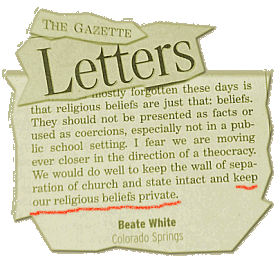
If belief in God is purely personal and publicly irrelevant, then all beliefs, no matter what their logical conflict, are essentially the same in a public arena except the belief that God and any moral absolutes are publicly irrelevant. Public expressions which challenge this fundamentalist assumption, such as commandment displays and prayer in Jesus' name, must therefore be censored.
Secularism is eclipsing other faiths in Europe and North America in the same way, for the same reasons, and with the same results accomplished by Islam in the Middle East, North Africa, and Central Asia centuries ago.
Muslim governments from Morocco to Malaysia take pride in the freedom they afford to their Christian minorities (0.6% in Morocco, 8.3% in Malaysia). These have complete freedom to worship, pray, and educate their children as they choose, as long as they do so privately without any public profile. Read your Bible at home – no problem. Take one to work – lose your job. Put a manger scene in church – no problem. Put one on a sidewalk – go to jail. Does this sound like parts of America?
Once upon a time in Egypt and Syria under Byzantine emperors, canon (church) law informed everything from public education to international trade, but many ambitious local rulers and contentious Christian sects (Jacobites, Melchites, Nestorians, etc.) resented Byzantine rule. These cooperated with Arab invaders. In her book on the decline of Eastern Christianity, Bat Ye'or writes, "Islamic domination over Christian populations was successfully imposed and consolidated due to a close collaboration between the Muslim state and the dhimmi [non-Muslim] leaders, who combined spiritual and temporal power" (p. 128).
Once upon a time in Europe, canon law had the same pervasive social influence, but many local rulers (i.e. Henry VIII) and contentious movements (Lutheran, Calvanist, Anabaptist, etc.) resented central authority and one another. In his book on Islam titled What Went Wrong?" Bernard Lewis explains how events like the Inquisition "compelled Christians to secularize their states in order to escape from the vicious circle of persecution and conflict" (p. 104).
Bat Ye'or notes, "The Christian leaders and the Churches easily adapted to the domination of Islam, which allowed a privileged minority to grow rich by farming tribute, and the Churches to retain their rites and the fiscal, legal, and spiritual control of their communities" (p. 129).
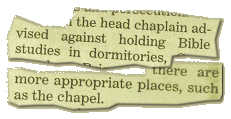 In modern Western Civilization, Churches and their leaders similarly accept waning public influence. Like Essau, who sold his birthright for a pot of porridge, they have exchanged public access for peace and tax exemption.
In modern Western Civilization, Churches and their leaders similarly accept waning public influence. Like Essau, who sold his birthright for a pot of porridge, they have exchanged public access for peace and tax exemption.
Ignorant of Eastern Church history, Western Christians are repeating it. Fundamentalist Muslims like Usama Bin Laden, sensing their doom, are lashing out. Fundamentalist Christians, who also reject the notion that social "morality should be based on rational considerations regarding human well-being in this world, to the exclusion of considerations relating to God and the after life" (Bernard Lewis, p. 96) are just embarrassed to be called fundamentalists.
Feedback:
Chaplain Responds to Article on Public Prayer in Jesus' Name
a letter to the Editor
As a military Chaplain I want to offer some insights from my own experience concerning your 3rd Qtr article on prayer in Jesus' name. I think the issue has developed farther than what you illustrated.
When I went to Chaplain school back in 1996, we discussed this issue. Something close to your explanation of "with" and "for" was generally accepted. One could say "In Jesus' name 'I' pray." I expanded this to, "Respecting all faiths freely gathered, this Chaplain prays according to his own faith in Jesus Christ."
This worked well until recently when I received a scripted prayer with exact words that included a simple "Amen." I did not know this was also a directive for closing, so, when I concluded in my usual manner, I was corrected sternly. While informed I did not have to go against my conscience, I was told I could not use Jesus' name in that way. Furthermore, the senior chaplain rejected my common practice saying, "It just draws more attention to the problem."
This presented a dilemma. While some denominations leave it more to the individual to sort things out, my own does not. Our prayers are always specifically and explicitly in Jesus' name. We follow the Bibilical teaching that without the Son one does not have the Father (John 5:23), and Jesus' instruction that we ask in His name (John 14:13).
Praying in Jesus' name means we pray according to all he has done and our faith in him. A name differentiates one person from another to eliminate confusion about who is being addressed. Jesus will not answer prayer that is not in his name, so I have no business praying in a manner which I would not expect Him to answer.
I also have no business praying deceptively or syncretisticly in order to pray "with" people of different faith rather than "for" them. One chaplain told me that he compromised by substituting an obscure or more inclusive title for Jesus because it gave him a public presence. Another chaplain said that he made the compromise because, "if this did not happen, then people would no longer feel the need for chaplains." This is like making a "deal with the Devil."
Hiding Jesus' name is not true pluralism. One faith can identify God merely as "God" and be free; another required to pray "in Jesus" cannot. In true pluralism, all chaplains should be able to pray publicly according to their own faith.
The whole thing causes me some heaviness. The world will say, "See, even your own people reject your narrow minded rigidity."
Facilitating silent prayer as an alternative is rarely a valid option, certainly not when given a scripted prayer. And the matter of a suitable closing to signify ending remains an issue.
I consider that the only option, if not allowed to pray "for" all faiths present in Jesus' name, is not to pray at all.
Faithfully in our Lord Jesus,
Chaplain T. H.
News:
Military Ministry Explodes Overseas
by Bruce Sidebotham
 Christian Businessmen's Association, Christian Legal Society, Association of Christian Geologists, Fellowship of Christian Athletes, Christian Medical and Dental Associations – these are just some of the many parachurch organizations committed to permeating their respective professions with the presence and influence of Jesus Christ. These can enter work environments forbidden to local churches, change lives that could otherwise not be reached, and redeem vocations as well as individuals.
Christian Businessmen's Association, Christian Legal Society, Association of Christian Geologists, Fellowship of Christian Athletes, Christian Medical and Dental Associations – these are just some of the many parachurch organizations committed to permeating their respective professions with the presence and influence of Jesus Christ. These can enter work environments forbidden to local churches, change lives that could otherwise not be reached, and redeem vocations as well as individuals.
For the military profession in America we have Officer's Christian Fellowship, Christian Military Fellowship, Cadence International, Navigator's Military Ministry, Campus Crusade's Military Ministry, and others. It doesn't stop with America. Three organizations, ACCTS [1] (USA), ACCTS-MMI [2] (UK), and MSO [3] (Korea) envision reaching out around the whole world by facilitating comparable professional organizations in every country.
Today, these parachurches of military professionals, called Military Christian Fellowships (CMFs) are loosely affiliated with one another in the globe spanning Association of Military Christian Fellowships (AMCF). Through AMCF, self governed and self sustaining fellowships around the world interact to encourage and learn from one another. ACCTS, ACCTS-MMI, and MSO facilitate this interaction through exchange programs, regional representation, regional conferences, and a once-every-decade World Conference.
This past September 2004, the military fellowships in South Korea hosted this decade's World Conference.
The South Koreans are relatively new participants in the field of international missions, but that didn't stop them from going all out to surpass all previous World Conferences for size and participation. They drew over 1,500 delegates from 133 countries (host country included) and enlisted nearly 2,000 Korean volunteers.
By partnering with Korean mission agencies that have workers in restricted access countries, the sponsors drew delegates from many nations in which military fellowships do not yet exist (i.e. Cuba, Sudan, China, Iran, Iraq).
By partnering with mature fellowships in strongly Christian countries and through their own dynamic churches, the Koreans raised hundreds of thousands of dollars to scholarship hundreds of delegates from struggling fellowships in many poor countries. ACCTS, for instance, funded delegates from 28 nations.
At this conference delegates got to fellowship with one another, pray together, report on military ministry in their respective countries, and hear about what is happening in others. Training included workshops on leading inductive Bible studies, holding prayer meetings, and leading others to faith in Jesus Christ.
On display was the amazing progress made in global military ministry since the last World Conference in 1994. Countries like Mongolia, Russia, the Ukraine and Israel now have their own growing MCFs. Furthermore, countries like Poland, Lithuania, and the Czech Republic, now have their own state sponsored chaplaincies. The seven-year-old International Association of Evangelical Chaplains (IAEC), which facilitates and encourages chaplain raining and fledgling chaplaincies worldwide, participated in the conference.
 Also on display was work that the Holy Spirit is doing in South Korea. With military service being mandatory for all males between 18 and 20, churches are reaching out to the entire country through military ministry.
Also on display was work that the Holy Spirit is doing in South Korea. With military service being mandatory for all males between 18 and 20, churches are reaching out to the entire country through military ministry.
South Korea's own fellowships, Military Evangelical Association of Korea (MEAK), Military Christian Fellowship of Korea (KMCF), and Korea Veteran Officer's Christian Union (KVOCU), have grown to hold the second largest membership of all countries in the world. Only Brazil has more members in similar fellowships. In a military chapel service at their Army's basic training facility, I watched over 2,400 basic trainees get baptized.
Connecting for fellowship with the MCFs of allies when sent around the world is one way that American service personnel can increase their own faith and serve more than just national interests. To find military ministry points of contact in a foreign country contact ACCTS (1-800-487-9108) or Campus Crusade's MilMin (1-800-444-6006).
NOTES
1. Association for Christian Conferences, Teaching, and Service
2. ACCTS - Military Ministry International
3. Mission Support Organization
News:
Uzbeks Rush to Christ In Spite of Hardship
by Nina Kelly
from Open Doors UK
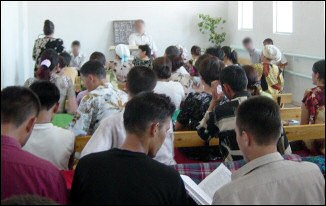 Sixteen years ago, there wasn't a single indigenous Christian in Uzbekistan. Mark Orton
[*]
met the first Uzbek Christian in 1989 and, on his return 15 years later, he discovered a vibrant church of several thousand.
Sixteen years ago, there wasn't a single indigenous Christian in Uzbekistan. Mark Orton
[*]
met the first Uzbek Christian in 1989 and, on his return 15 years later, he discovered a vibrant church of several thousand.
Mark works with Open Doors, an organization supporting persecuted Christians around the world, and he explains how it all came about: "For years, during the 70s and 80s, Open Doors had a vision for this part of the Muslim world which had no opportunity to hear the Christian gospel for 70 years under the Soviet regime.
"We tried to train and inspire the German Baptist churches in the area to reach the Uzbeks, but without much success.
"However, during the 90s both the German Baptist and the Russian churches returned to their own countries; but just before they left, a Russian church reached a few Uzbeks with the gospel and shortly after that, revival started.
"It has been exciting and such a privilege to be part of that, and we now have a number of team members who are very key people in this Uzbek church."
Church growth is strong in the north, around the once enormous and life giving Aral Sea. During the 50s and 60s communist authorities diverted rivers to irrigate cotton. Coastal villages are now 75 miles from the coast, with ships still stuck in the desert because the sea shrank so rapidly.
Mark said, "I asked one of the brothers why people were turning to Christ. He said, 'Firstly, people don't want to turn to Christ because of the persecution, but they know they have to because the message is so compelling.'" Then he said, "I think the fact that the Aral Sea has dried up has really shaken people. The whole of their lives revolved around the sea - they worshipped the sea. One day, at the end of the 80s, they saw the shoreline move back in just one day and it was as if their whole lives were disappearing in front of their eyes. The whole village wept. So that is another reason why people are open to the gospel."
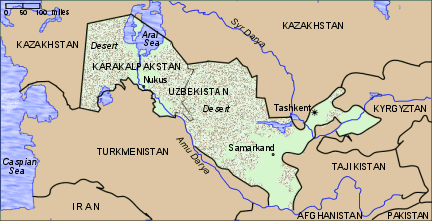 Mark was shocked to see so many people living in decayed, badly built tower blocks from the Soviet era with no electricity, bad water, no money and empty shops.
Mark was shocked to see so many people living in decayed, badly built tower blocks from the Soviet era with no electricity, bad water, no money and empty shops.
At the same time a tremendous Christian revival is happening. Mark explained how they share their faith: "Most of the converts are 20 to 30 years old and meet in homes because the police are hunting for them. During the day, they train in evangelism, and in the evenings they visit friends, share the gospel and people turn to Jesus.
"In the town I visited, they have 70 cells and their vision is that every year they multiply by two, so they are hoping for 140 cells next year.
"In order to multiply they must first prepare a leader. They then have five steps to spiritual life that the group has to learn. As they get to fifteen people, they divide so that they won't attract the attention of the police."
The Christians are nervous about persecution. They only invite people once they are sure they have genuinely decided to follow Jesus. Mark says, "Most people are either atheists or Muslims, and both have a vested interest in stopping the Christian revival."
Christians are often arrested on spurious charges and kept in prison for days, interrogated and beaten painfully on the soles of their feet. Persecution within families is another difficulty. One boy was taken hunting by his Muslim father and deliberately shot dead.
Mark met two female Christian medical students. He reported, "One of the professors barged into their room, searched it, and found some Bibles. They were soon thrown out of their accommodation. That is the sort of treatment they get all the time. Yet, in spite of that, people keep coming to Christ."
Open Doors helps by printing Christian material, taking in literature, and training new Christians and Christian leaders.
At the beginning of this revival were many miracles, despite the fact that the Christians say they are not charismatic or focused on miracles, but on the word and on discipleship. One evangelist was hospitalized with a serious infectious disease and was so weak she couldn't sit up. Four Christians went to the hospital and as they read the Bible and prayed and cried together, the lady sat up and is now well again.
The Christians feel they are reaping the fruits of the prayers of evangelists who have come before, and they are very grateful to the missions who are still helping them.
Mark tells of one Christian, Samuel [*], who was converted as a 19-year old and baptized half an hour later in a lake. The visiting pastor then gave him a Bible, told him he was now a minister of God, and left him in charge of the six who had also turned to Christ with him!
Samuel didn't know what to do so he took one Bible verse each day, spoke about it, told the people that Jesus died for their sins and sang some songs. Then people would be healed and many people would come to Christ.
He finally received three months of Bible training in Kyrgyzstan, but when he came back in 1995, the persecution started. Firstly, his wife lost her job as a computer teacher because her husband was a Christian. Then the local police threatened him with arrest if he was caught out on the streets. Then they came to his home handcuffed him, and arrested him in front of the neighbors.
Mark says, "In a small town, that means you are a criminal."
On his release, Open Doors supported him through a year in Bible college. But again, on his return, he was arrested and accused of planting a bomb in Tashkent. His religious books were confiscated, and they were rude to his wife, who was crying. He was again humiliated in front of the neighbors, taken to the police station, and imprisoned. Samuel said, “They knew it wasn’t Christians who had done it. It was just a way of intimidating us. They wanted to make a video of me asking the president of Uzbekistan for forgiveness, but I couldn’t do that. I wasn’t guilty. Why should I ask for forgiveness?”
One time in prison, he refused his bread as he was fasting. The criminals in prison started asking questions. Samuel was able to tell them about Christ, and they cried as he told them, "God loves you."
Following four months in a freezing cold cell, sleeping on a concrete floor with no blanket in the middle of winter, Samuel was threatened with eight years in prison despite the fact they had no evidence against him and his only wrong-doing was the storing of religious books and supposedly washing a woman in the river because he was baptizing people.
Due to lack of evidence, Samuel was eventually released. He reports, "Now the persecution is less from the authorities and more from the Mullahs (the Islamic authorities)."
A particularly hard thing to bear in their culture is that Christians are denied burial in the family tomb. Some Christians have had their cars tampered with to try and create car accidents as a way of intimidating the Christians.
In one town, a pastor was arrested, along with his family, and taken to the city limits and told never to come back. In this same town, a Russian pastor had a registered church but lost his registration and his livelihood, for actively witnessing to the Uzbeks.
Open Doors have lent him some money to set up a small restaurant so he can earn a living. It is one of 60 different micro-credit projects set up by Open Doors for helping people set up a small business.
Mark sums up the situation for Christians: "The people are very poor, there is terrible unemployment, they have a lot of persecution from many sources; yet they have the Lord, they have a tremendous joy, they are sharing the gospel, and they are seeing many people come to know Jesus."
NOTE: [*] names changed for security reasons
Profile:
Spiritual Landscape of the Sudan
The first convert from the region of the upper Nile (modern Sudan) was the eunuch treasurer in the court of Queen Candace (Acts 8:26-40) around A.D. 37. In the sixth century, Christianity became the state religion of three kingdoms, Nobatia, Maqurrah, and Alwah, with capitals near the modern Nile River cities of Wadi Halfa, Marawi, and Khartoum respectively. These endured for 1000 years, withstanding waves of Arab attackers until they fell in the early 1500s, making way for rapid Islamization in the north. Primitive southern tribes were harvested for slaves and remained mostly pagan. [1]
During the century of British rule (mid-1800s to 1956), missionaries started schools, hospitals, and churches in the south but not in the north, where the rulers feared inflaming Muslim opposition. Cultural and economic distance between the Arabicized north and Black south increased. [2]
Shortly after gaining independence, civil war ensued. Since then, Sudan has known only eleven years of peace (1972-1983), making this conflict the longest of the 20th century and the costliest in human life since World War II. Since 1983, over two million southern black civilians have been killed and over four million have been displaced. [2] Following the Missionary Act in 1962 foreign missionaries had to leave. [3] In 1989, the central government mandated Shari'a law to be over both the north and the south. [4] In 1991, the Criminal Act made converting out of Islam a capital offense. [2]
Genocide and ethnic cleansing are nothing new in Sudan, where white Arab Muslims have been slaughtering, abducting, and enslaving black southern "infidels" for years. [5] So why the sudden interest in what has been happening in the province of Dafur? The blacks of Dafur are not pagans or Christians. They are Muslims. [6] When white Arab Muslims are slaughtering black pagans and Christians, world governments don't notice, but when they start slaughtering black Muslims, it is suddenly genocide. [7]
Some 45% of Sudan's thirty million people are either Arabs or have been thoroughly Arabicized. Non-Arabic Muslim groups comprise about another 20% of the population. The major ones are: the Dinka (6%) who dwell along the White and Blue Nile and its major tributaries, the Beja nomads (2%) who roam hills along the Red Sea, the Nubians (1%) along the Nile in the north, and the Fur and the Zaghawa (1%) in the Marra Mountains of Dafur. [1]
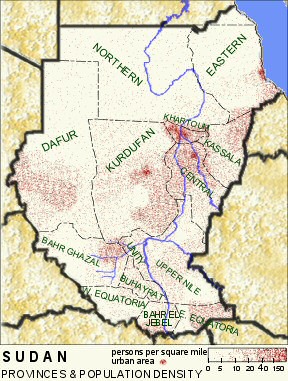 Over 100 other ethnic groups with distinct languages comprise the remaining 35% of Sudan's population. Two-thirds of these are Christians. One-third follow traditional tribal religions. Most of these non-Muslims live in the southern third of Sudan. At least forty different languages of both Muslim and Christian peoples are spoken in the centrally located Nuba Mountains. Many Dinka in this southern region are Christians. Arabic serves as a lingua-franca in the north. English serves that purpose in the south.
[6]
Over 100 other ethnic groups with distinct languages comprise the remaining 35% of Sudan's population. Two-thirds of these are Christians. One-third follow traditional tribal religions. Most of these non-Muslims live in the southern third of Sudan. At least forty different languages of both Muslim and Christian peoples are spoken in the centrally located Nuba Mountains. Many Dinka in this southern region are Christians. Arabic serves as a lingua-franca in the north. English serves that purpose in the south.
[6]
Total Christians in Sudan number over five million in around 40 denominations. Protestant and Independents are close to one million. Anglicans claim over two million. Roman Catholics have over three million. Four different Orthodox traditions claim several hundred thousand. Nearly two million Christians live as an oppressed minority in the north, many of these as refugees in Khartoum which has a total population of over ten million. Evangelical Christianity is growing at an annual rate of seven percent. [8] From 1960 to present the ratio of Christians in the war torn south has grown from 5% to 70%. [9] Over 30 organizations from some 20 countries have missionary, relief, and development work in Sudan. [8]
SOURCES:
1. Encyclopedia Britannica
2. www.family.org/fofmag/sl/a0024079.cfm
3. www.ecoi.net/doc/en/SD/indexfull
4. www.samaritan.org
5. www.uscirf.gov
6. www.ethnologue.com
7. www.nationalreview.com/comment/shea200406300855.asp
8. Operation World
9. www.worldevangelical.org/persec_sudan_05jun02.html
| M I N I S T R Y C O N T A C T I N F O R M A T I O N | ||
| Agency | Type of Ministry | Contact Data |
| Africa Inland Mission | training church leaders | www.aim-us.org |
| Association of Christian Resource Organizations Serving Sudan (ACROSS) | evangelism, relief, & agricultural development. | based in Nairobi, Kenya |
| Campus Crusade for Christ | Dafur emergency relief fund | www.ccci.org |
| Food for the Hungry | relief & development |
www.fh.org |
| Frontline Fellowship | advocacy, relief & development, evangelism & church support | www.frontline.org.za |
| In Jesus' Name Ministries | emergency relief | www.injesusname.org |
| Living Water International | resource development | www.water.cc |
| MAP International | medical supplies | http://www.map.org |
| Persecution Project Foundation | advocacy | www.persecutionproject.org |
| Presbyterian Church USA | community development | www.pcusa.org |
| Operation Mobilization | evangelism | www.om.org |
| Samaritan's Purse | medical care, famine relief & peace advocacy, evangelism & church support | www.samaritan.org |
| South Sudanese Friends International (SSFI) | reconciliation & community development | www.southsudanfriends.org |
| WEA Religious Liberty Commission | advocacy | www.worldevangelical.org |
| World Vision | Dafur health care | www.wvi.org |
| YWAM Mercy Works | emergency relief | www.mercyworks.org |
Opportunity:
Zwemer Institute of Muslim Studies
at Columbia International University in Columbia, South Carolina (not far from Fort Jackson).
Winter Studies 2005:
- January 10-14 Church Planting Among Resistant Peoples (Zwemer faculty)
- January 17-21 Issues in Islam (Dr. Nabeel Jabbour)
- July 4-8 Introduction to Islam (Dr. Steve Johnson)
- July 11-15 Folk Islam (Dr. Dave Cashin)
- July 18-22 Approaches to Islam (Dr. Phil Parshall)
- July 25-29 Revelation, Qur'an and Muslim Tradition (Dr. Steven Masood)
Or contact Vanessa:
- e-mail: Vmagnus@ciu.edu,
- phone: 1-800-777-2227, ext. 3327.
